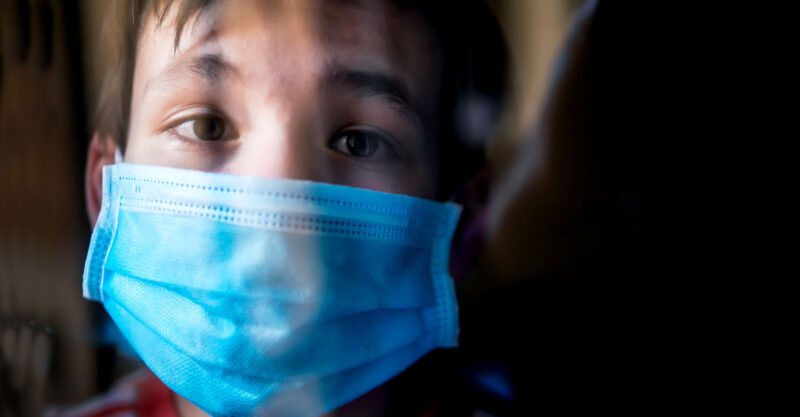by Dr. Joseph Mercola, Childrens Health Defense:
 Children who aren’t exposed to germs on a regular basis have different microbiomes than those who are. Exposure to nonpathogenic microorganisms train the immune system to function normally and not react excessively or unnecessarily.
Children who aren’t exposed to germs on a regular basis have different microbiomes than those who are. Exposure to nonpathogenic microorganisms train the immune system to function normally and not react excessively or unnecessarily.
Story at a glance:
- Children who aren’t exposed to germs on a regular basis have different microbiomes than those who are. The microbiome, in turn, plays a decisive role in how well one’s immune system works.
TRUTH LIVES on at https://sgtreport.tv/
- Exposure to nonpathogenic microorganisms helps prevent immune-mediated chronic disorders, as they act as immunomodulatory signaling agents. They basically train your immune system to function normally and not react excessively or unnecessarily.
- There’s also evidence suggesting that certain childhood infections may reduce your risk of certain chronic illnesses. Measles infection, for example, could potentially lower your risk of cancer in the future.
- In August 2021, a French group of pediatric infectious disease experts warned that “immunity debt” caused by a lack of exposure to common viruses and bacteria during COVID-19 lockdowns and school closures may predispose children to suffer more infections in the future.
- The potential benefits of natural infections have fallen by the wayside as the single-minded focus on vaccination has taken over. We now see the medical industry trying to erase knowledge about the lifelong benefits associated with infections, especially childhood infections.
As reported by The Atlantic in early November, children who aren’t exposed to germs on a regular basis have different microbiomes than those who are.
In April 2021, a year into widespread COVID-19 lockdowns and the obsessive focus on antibacterials, microbiologist Brett Finlay predicted that “five years from now we are going to see a large number of kids with asthma and obesity.”
Contact with microbes trains your immune system
The “hygiene hypothesis” was initially proposed by epidemiologist Dr. David Strachan in 1989.
He believed the rising incidence of allergies was linked to reduced exposure to viruses and bacteria, thanks to smaller family sizes, which means fewer siblings from whom infants are exposed to germs and infections.
In 2003, Graham Rook refined the hypothesis, renaming it the “old friends” hypothesis (a name that never stuck).
Rather than including both good and bad germs, Rook’s version of the hygiene hypothesis emphasized the importance of exposure to nonpathogenic (friendly) microorganisms in the building of robust immune function.
According to this narrowed view of the hygiene hypothesis, exposure to nonpathogenic microorganisms is an important way by which immune-mediated chronic disorders are prevented, as they act as immunomodulatory signaling agents, basically training your immune system to function normally and not react excessively or unnecessarily.
The video below reviews how feedback loops in the natural world, where X affects Y and Y affects X, help keep nature in balance and promote resilience in natural systems.
The same kind of feedback loops exist within the human body, between microbes and various systems such as your immune system, and between your body and its environment.
Can certain infections provide long-term benefits?
There’s also evidence suggesting that certain childhood infections may reduce your risk of certain chronic illnesses. One such theory is that measles infection may lower your risk of cancer.
Researchers have found 1 in 4 cancer patients lacked antibodies against measles, and more than 1 in 3 lack antibodies against mumps, which suggests they were never sick with mumps or measles, and any vaccination has worn off.
Incidentally, measles virus is also being used as part of cancer treatment. In one reported case, a woman with incurable blood cancer went into remission after receiving a huge bolus of measles virus.
Unfortunately, the potential benefits of natural infections have fallen by the wayside as the single-minded focus on vaccination has taken over.
The idea nowadays is to prevent all infection, even if there are benefits to infection, and even if there are downstream adverse events to vaccination.
The COVID immunity debt bubble is bursting
In August 2021, a French group of pediatric infectious disease experts warned that “immunity debt” caused by a lack of exposure to common viruses and bacteria during COVID-19 lockdowns and school closures may predispose children to suffer more infections in the future.
They predicted the decrease in viral and bacterial exposure that train your immune system may result in a rebound of a variety of infectious diseases, including influenza and respiratory syncytial virus (RSV), which is what we’re seeing now, as we head into winter in 2022.
According to the authors:
“While NPIs [non-pharmaceutical interventions] limited the transmission of SARS-CoV-2, they also reduced the spread of other pathogens during and after lockdown periods … The lack of immune stimulation due to the reduced circulation of microbial agents … could have negative consequences when the pandemic is under control and NPIs are lifted.
“The longer these periods of ‘viral or bacterial low-exposure’ are, the greater the likelihood of future epidemics. This is due to a growing proportion of ‘susceptible’ people and a declined herd immunity in the population.”
In an article for Wired, journalist Maryn McKenna in late April 2021 also wrote:
“Social distancing, lockdowns, and masking … seem to have quenched some of the other respiratory diseases that circulate in the winter. Influenza, respiratory syncytial virus (RSV), enterovirus D68 — this year, the surveillance networks that keep track of those diseases could barely find them …
Read More @ ChildrensHealthDefense.org



